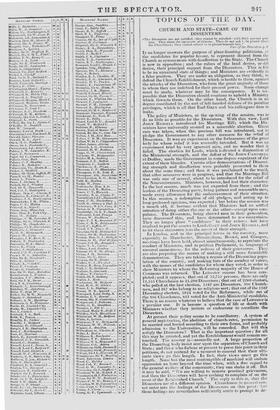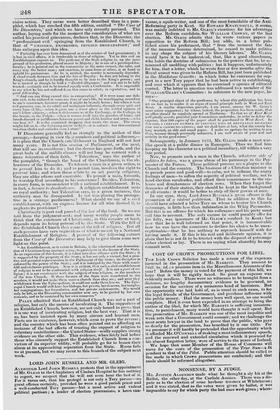-- -, Topics OF THE DA1
present posi plaerd Mime
staters. p.
icians, or from the
e Church e, or did his is fell idently in think, to n, against y of those c change It is itn- Ministry is in no pectiliar
i have discovered this, and have determined to use con
e Church e, or did his is fell idently in think, to n, against y of those c change It is itn- Ministry is in no pectiliar s dare to n, was to ew, Lord the Pis.- . Great , not to relief of the great t was an r that it notion of
Sli'RELL nt of the Dissent- to them he world, iage Bill relief of haractcr. and the ble men, situation. g up to sion Wa$ settled on COM- oration, tit have ELL, and v, more Glasgow, bate the uage of . They .midable fig popu- f voters, order to 10111FC of n are only electors, Church- the 1107 out of ndidate. ces ter is th with ate the stem of sion to probably till this for all main un- rtion of arch and in their ir ulti- go this endure gard to If, But vances, on the hat the al can- it: but to de- cisive action. They never were better described than in a pam- phlet, which has reached the fifth edition, entitled " The Case of the Dissenters," and which we have only recently perused. The author, laying aside for the moment the consideration of what are called his practical grievances, declares that, to the Dissenter, the " predominant evil" springing from the Established Church, is that of " UNIFORM, EXPRESSED, IMPLIED DEGRADATION;” and thus enlarges upon this idea.
" Partiality has ever been denounced as of the essence of bad government ; it is ban in civil affairs, it is intolerable in those of religion. Yet to this evil an Establishment exposes us. The professor of the State religion is, on the mere ground of his profession, placed nearer to Majesty ; he is one of a privileged fra- ternity ; he is pointed out to the community as the more correct, the safer, and every way the better man ; and exaction, iu some form or other, is at hand to uphold his pretensions. As he is exalted, the seceder is necessarily degraded. A. cloud stands between him and the face of Royalty : he does not belong to the King's church, and he is hardly thought to he true to the King's person ; and he is treated as though he held a "divided allegiance," and was not to be fully trusted—certainly not to be trusted equally with a Conformist. It is impossible to say what he has not suffered nom this cause in estate, in reputation, and in good fillowship. " And can any thing exceed this in exasperation? If it were some one defi- nite evil, tube endured at some one time of one's life, for worshipping according to one's conscience, however great, it might be bravely borne ; but when it is an evil pursuing one, in its subtle and malignant influence, through every path and every hour of life,—when it gives one a lower place in the setlled opinion of one's fellow citizens,—when it dishonours us at the Exchange, at the College, in the Senate, in the Pulpit,—when it worms itself into the paradise of home, and breeds discord or indifference between parent and child, brother and sister,—who can bear it ? It is the continual dropping that wears the stone. The storm might fall on it—the lightning might sit ike it—it is unhurt : but this continued vexation chafes and corrodes even a stone!"
If Dissenters generally feel as strongly as the author of this passage,—keeping in view their numbers and political influence,— it is plain that the Church esta'Aishment in England will not last many years. It is not this session of Parliament, or the next, that will see its overthrow; but the decree has gone forth, and the great body of the middle classes will not long be content with a mere toleration of their faith. " Toleration,„ says the author of the pamphlet, ” though the boast of the Churchman, is the ab- horrence of the Dissenter. To tolerate a man in a given action, is to permit him to do it ; and to permit him, involves the right to prevent hint; and when these relate to an act purely religious, they are alike odious and execrable. To permit a man, forsooth, to worship God according to his conscience! Besides, Toleration, in every form, is inconsistent with a national establishment. It is, in fact, a licence to disobedience. A religious establishment rests on royal authority ; but Toleration says, in a given instance, this authority may be disregarded. Is not this placing the preroga- tive in a strange predicament? What should we say of a civil establishment, with an express licence for all who desired it, to neglects its provisions?" Christianity is part and parcel of the law of the land. So we are told from the judgment-seat; and many worthy people seem to think that time existence of Christianity, in this country at least, depends upon its being patroni: ed by the State. With the fall of the Established Church they connect the tall of religion. But all such persons have very vague ideas of what is meant by a National Establishment of Religion. A perusal of the following extract from the Case of the Dissenters may help to give them some new light on this point.
"An Establishment, as it exists in Britain, is the selection of one denomina • tion of Christians from amongst many, to participate in the favour of the State. As an expression of this favour, it is taken into close alliance with the State; it is supported by the property of the State ; it has not only a virtual, but a posi- tive and personal representation in the Parliament of the State ; its discipline is enforced by the power of the State; and it is indulged by the State with mani- fold and exclusive privileges. Now it is evident, that such a civil establishment of religion is not to be confounded with religion itself. It is not a part of re- liion ; it is not coextensive with the subjects of true religion, or the members of the true Church. If these favours of the State were trausferred to the seceders, it would not make them more a church than theyate ; and were they withdrawn from the Episcopalians, it could not make them less so. The Epis- copal Church would still have her bishops, her priests, her deacons, her temples, her congregations, her formularies, and her private endowments. She would only be left, as the Dissenting communities now are, to be guided by her own counsels, and to be sustahnd by her own resources."
PALEY admitted that an Established Church was not a part of religion, but only time means of inculcating it. The supporters of an Established Church, however, are not only bound to prove that it is one way of inculcating religion, but the best way. That it is so, has been insisted upon by many sincere and learned men. Facts are in existence, however, which seem to prove the reverse ; and the country which has been often pointed out as affording an instance of the bad effects of trusting the support of religion to voluntary contributions—the United States—really supplies strong evidence on the other side. This evidence, when fairly laid before those who sincerely support the Established Church from a con- viction of its superior utility, will probably go far to lessen their alarm at its approaching separation from time State. Room fails us at present, but we may recur to this branch of the subject next week.





















 Previous page
Previous page